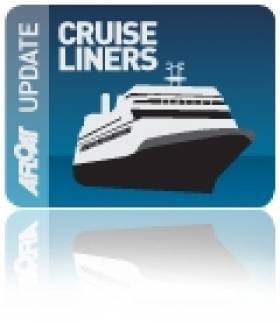Displaying items by tag: Dublin Port cruise calls
‘Lost Weight’ Cruiseship to Call to Dublin Port
#CRUISE LINERS – Following Friday's first cruise call to Dublin Port this year of the 300-plus passenger Arion as previously reported, the considerably larger Grand Princess is to call on Wednesday. Notably on this occasion the 2,600 passenger cruiseship is to appear without her signature 'Skywalker' Nightclub, which used to be perched 18 decks-high at the aft of the vessel, writes Jehan Ashmore.
The aptly named nightclub was built on two legs to form a bridge (see PHOTO) and was accessed by a glass gangway. Not only was the structure at such an elevated position but it also overhang beyond the sheer of the stern superstructure below, where clubbers had bird's eye views over the oceans and to numerous ports of calls.
In an operation to remove the Skywalker last year, the structure weighing 211 tons took over 10 hours to complete (as previously reported including VIDEO of the work). The reason for removing the nightclub according to her owners Princess Cruises was to 'significantly improve the operational performance of the ship, including greater fuel efficiency.' For a post dry-docking view click PHOTO.
During the procedure at the Grand Bahama Shipyard in the US, the opportunity included the installation of a new nightclub three decks below and was named One5.
Ironically before the vessel lost weight!....she was the first cruiseship to visit Dublin Port to surpass the 100,000 tonnes milestone, when the leadship of the 'Grand' class docked in 2004.
























































